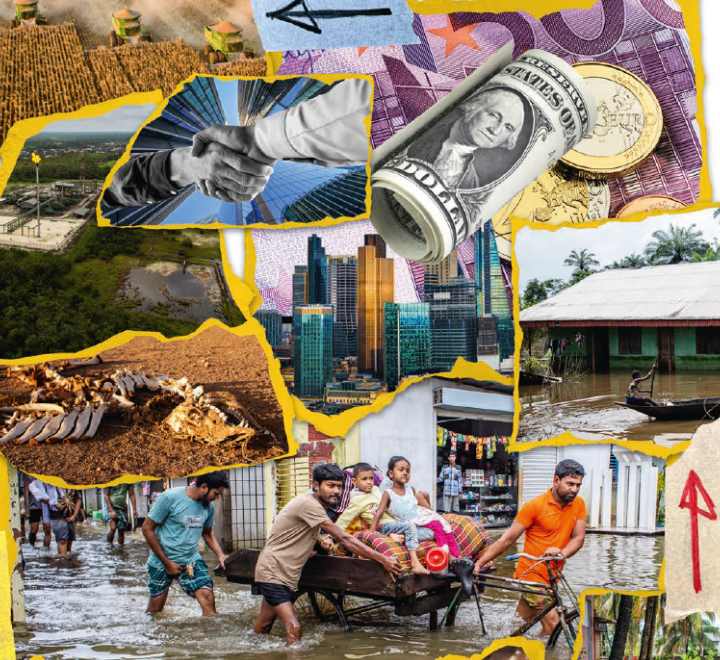Climate-wrecking fossil fuel and industrial agriculture sectors are squeezing climate-hit countries for over US $600 billion in public subsidies every year.
- Corporate capture of public finance means that each year, the climate-destructive fossil fuel and industrial agriculture sectors receive US $677 billion in subsidies in the Global South. This amount could pay for primary school education for all sub-Saharan African children more than 3.5 times over.
- Between 2016 (when the Paris Agreement was signed) and 2021 (the most recent year with available data), the industrial agriculture sector in the Global South received an annual average of US $238 billion in public subsidies, which increased to US $276.4 billion in 2021.
- Between 2016 and 2023, the fossil fuel sector received an even more shocking annual average of US$438.6 billion a year in publicly financed subsidies from Global South countries. Fossil fuel subsidies have steadily risen over this period, reaching US $495.3 billion in 2023.
- Climate finance grants from the Global North for climate-hit countries are still grossly insufficient to support climate action and the necessary transitions. Climate finance grants amount to just 1/20th of the Global South public finance for fossil fuels and industrial agriculture.
- The lack of real climate finance for solutions in the Global South means that renewable energy receives 40 times less public finance than the fossil fuel sector.
How the Finance Flows: Corporate capture of public finance fueling the climate crisis in the Global South examines the use of public funds in the Global South and finds that the same industries that are causing the climate crisis and harming communities are also successfully squeezing Global South governments for the lion’s share of public finance. Multinationals benefiting from these subsidies include Shell, the fossil fuel corporation, and agribusiness giant Bayer (the parent company of Monsanto).
Meanwhile, the failure of Global North countries to provide adequate climate finance for climate transitions means that Global South countries are locked into harmful development pathways that destroy ecosystems, grab lands, and compound the injustice of climate change.
These numbers illustrate a deeply worrying pattern about the state of the planet’s finance flows, and how corporate capture of public finance is actively undermining the needs of climate-vulnerable countries, as well as global climate commitments.
Arthur Larok, Secretary General of ActionAid International, says:
“This report exposes wealthy corporations’ parasitic behavior. They are draining the life out of the Global South by siphoning public funds and fueling the climate crisis. Sadly, the promises of climate finance by the Global North are as hollow as the empty rhetoric they have been uttering for decades. It is time for this circus to end, we need genuine commitments to ending the climate crisis.”
Teresa Anderson, Global Lead on Climate Justice at ActionAid International and one of the report’s authors, says:
“It seems that money is the root of all climate upheaval. Climate-destructive industries are bleeding the Global South of the public funds they should be using to deal with the climate crisis. The lack of public and climate finance for solutions means that in climate-vulnerable countries, renewable energy is receiving 40 times less public finance than the fossil fuel sector. It’s time for the Global South to stand up to the industries that are draining their finances and wrecking the climate. We need to fix the finance flows that are fuelling the climate crisis.”
The report also debunks the false narrative that fossil fuel and industrial agriculture expansion in the Global South is necessary to address food insecurity and energy poverty and to provide livelihoods and public revenue in the Global South.
Jonah Gbembre, an activist from Iriwekan in Nigeria’s Delta State, where Shell’s fossil fuel extraction has had devastating local impacts, adds:
“Communities in the Niger Delta have witnessed first-hand the irreparable damage caused by oil drilling. Rivers that support livelihoods are polluted. People are struggling to get drinking and irrigation water, and fishing is no longer possible as all the fish have died. The flaring has caused health problems for our children. We have lost our way of life, and there is no end in sight to our suffering. We can’t continue to live like this. Our cry is that our taxes should not be supporting the oil companies like Shell that extract our resources and destroy our communities and way of life. Instead, the government should be financing alternative forms of energy such as solar and wind that will not harm us.”
The report calls for:
- Public finance to be redirected to support just transitions from climate-destructive fossil fuels and industrial agriculture, towards people-led climate solutions that safeguard people’s rights to food, energy and livelihoods.
- Scaling up of decentralised renewable energy systems to provide energy access, and gender-responsive agricultural extension services that offer training in agroecology and adaptation.
- Wealthy countries to provide trillions of dollars in grant-based climate finance each year to Global South countries on the front lines of the climate crisis, including by agreeing to an ambitious new climate finance goal at COP29 that reflects this scale.
- The regulation of the banking and finance sectors to end destructive financing, with regulations that set minimum standards for human rights, social and environmental frameworks, and transformation of the international financial institutions that are pushing climate-vulnerable countries into spiralling debt.
ENDS
To contact the ActionAid Press Office email media-enquiries@actionaid.org or +263776665065.
We have French, Spanish, English, Portuguese, Swahili speaking spokespeople available.
Notes to Editors
- The research was done in partnership with independent research organisation Profundo.
- This is the second of ActionAid’s annual “How the Finance Flows” flagship report series, scrutinizing the finance flows fuelling the climate crisis. In 2023 the first How the Finance Flows report showed groundbreaking new data on the extent to which banks are financing fossil fuels and industrial agriculture in the Global South. 2023’s How the Finance Flows: The banks fuelling the climate crisis can be found here.
About ActionAid
ActionAid is a global federation working withmore than 41 million people living in more than 71 of the world’s poorest countries.We want to see a just, fair, and sustainable world, in which everybody enjoys the right to a life of dignity, and freedom from poverty and oppression. We work to achieve social justice and gender equality and to eradicate poverty.






